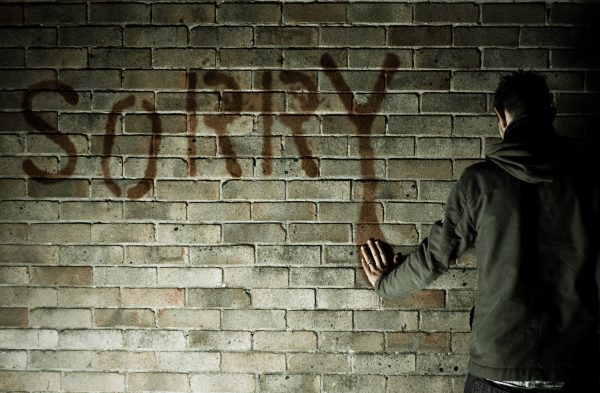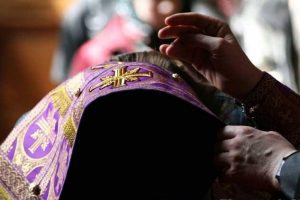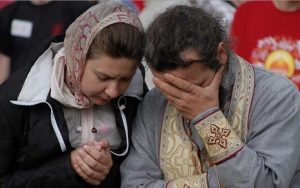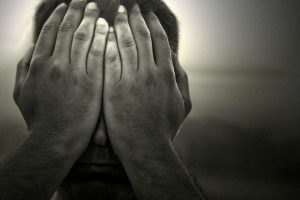I was born a WASP—that is, a White, Anglo-Saxon, Protestant. Now that I have become Orthodox, I suppose I am a WASO, though the acronym lacks the same punch. As a WASP growing up in the 60’s and later, I was encouraged with all my generation to repent of things I never actually did. That is, I was encouraged to feel guilty about the white man’s treatment of the Canadian Indian (the term “First Nations” was unknown then), the Canadian government’s treatment of the Japanese during the second world war, and the Christians’ treatment of the Jews in the world generally and in Nazi Germany in particular. I dutifully obliged in all this, and felt a tremendous sense of righteousness in doing so. It was fairly easy to repent of these things actually, for I didn’t really feel guilty of the sins for which I said I was repenting. The truth is that I was actually repenting second-hand, repenting of things which were done by my father’s generation, and my grandfather’s generation, and my great-grandfather’s generation. I had not myself treated these people badly (nor, come to that, had my father or grandfather). To be honest, I had scarcely met any of these people. I had never met an Indian (or First Nations person) when I was growing up in suburban Toronto. The closest I ever got was hearing about how George Armstrong, captain of the Toronto Maple Leafs, was an Indian. (He was affectionately referred to as “the Chief” and was very cool.) The only Jew I ever met was the Rabbi I interviewed for a project on Judaism in high school. The only Japanese I ever met was Maxine, a cute little girl who lived at the other end of my street. She was the only Japanese in our school, and we didn’t play much together, largely because she was a grade ahead of me and we didn’t play with the bigger kids. And we boys certainly wouldn’t be caught dead playing with girls. So, like I said, my repentance of these sins had a certain air of unreality to it. The sense of self-righteousness coming from that repentance, however, was very real. Such penitential breast-beating made me a liberal, a decent guy, and a good person. Though I didn’t articulate it, I felt a certain moral superiority over those previous generations. And this is where the danger comes in.
The truth is that the human race is not a very nice species. We oppress and hurt anyone smaller and more vulnerable than ourselves. Big kids pick on little kids; kids without glasses mock kids with glasses (or used to); men victimize women, adults beat and use children; stronger races and peoples hurt weaker ones, the rich exploit the poor, human beings are cruel to animals. It is not just First Nations, Jews, and Japanese who have been sinned against—any group that is vulnerable long enough comes in for oppressive treatment.
The universality of the oppression of course does not justify it. It is a good thing to recognize where such oppression has taken place and to decry it as morally reprehensible. If someone, for example, knew about the Nazi genocide of the Jews, or the Turkish genocide of the Armenians and thought it was okay, such a person would be justly denounced as being bereft of moral compass. Having a moral compass means recognizing sin when it takes place and not being shy about denouncing it.
But actual repentance is something different. The sin for which God calls me to repent is personal sin—stuff that I actually did. And personal sin feels different too: when I am lazy, or lustful, or impatient, or commit the multitude of other sins which fill my confessions, I feel badly. The memory of it comes back in the wee hours of the morning, and I feel ashamed. It is otherwise with my second-hand repentance; my conscience never keeps me up with thoughts of the Jewish genocide, because I was never involved in it. I don’t really feel ashamed—I feel very sad that such a monstrous crime occurred, but not personally guilty for it, as I feel guilty for my own sins. For my generation, the guilt for such crimes as is perhaps national, or racial, or societal. But it is not personal to me, and only personal guilt can (or should) make you feel guilty. Recognition and confession of national offences can only be done nationally, through government pronouncements and policies, but not personally by individuals who were never there. (Of course in the case of Nazi war crimes, individuals who were there and who actually committed those crimes may still be alive; they also need to repent personally for what they did. Theirs would be a first-hand repentance, not a second-hand one.)
So, in second-hand repentance, we have the following scenario: in exchange for a little unreal penitence over something I never actually did, I get a tremendous sense of self-righteous smugness about being a good person. That is the danger, because this smug feeling can stop me from looking at the sins of which I am actually guilty. Of course we need to retain our moral compass and identify national oppression of other groups as sinful, otherwise we may never learn from history, and may end up repeating the same sins ourselves in our own generation. But personal repentance concerns what we have done personally, and things for which we must one day give account before the dread judgment seat of Christ. As I look for things to repent of, I find that I needn’t go so far afield as things done in the days of my father (that good man) or my grandfather. There is much more material for my confession closer to home. Second-hand repentance is not bad, but it must not be allowed to substitute for the first-hand repentance of which I am in urgent need.




















